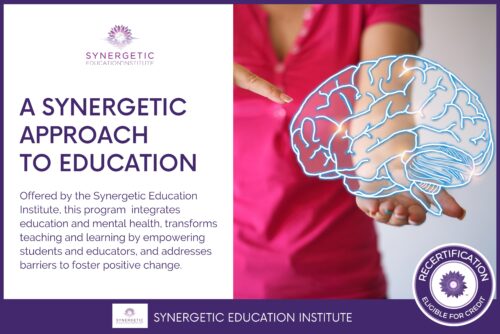This program is for you if you work IN SCHOOLS (as a school counselor, social worker or psychologist, or a school-based mental health professional) or if you COLLABORATE WITH educators or schools!
**For all program details and dates of when this program is offered, please visit the Synergetic Education Institute's website**
A Synergetic Approach to Education (formerly One Foot in Education: Exploring Education Through an SPT Lens) offered by our sister institute, the Synergetic Education Institute, is a distinct and transformative approach to learning and teaching, working at the intersection of education and mental health! Synergetic educators recognize that the collaborative efforts of educators, students, classrooms, and educational systems produce a more substantial impact than individual contributions. This approach spans the landscape of working with students and perceived challenges and barriers, considering all aspects of learners and the learning environment. It incorporates neuroscience and nervous system regulation research with empowerment practices to create positive change within the immediate environment while maintaining a broader perspective using integrated and differentiated approaches. You will delve into strategies designed for educational settings that promote trauma-informed, social-emotional support within schools. You'll learn to implement these strategies as well as understand the neuroscience behind them, empowering you to support others in deepening their knowledge and awareness. You will also learn how to...- Implement approaches based on neuroscience that support the development of self-regulation skills, including critical skills that are often missing from SEL programming.
- Support educators in understanding how to prepare brains and bodies to learn, including articulating the links between neurophysiological states and classroom behaviors
- Identify the dynamics behind complex student-adult relationships and how to shift these challenging interactions.
- Increase feelings of safety and belonging for students and adults
- Implement small shifts in daily routines that include explicitly teaching critical skills using both "top-down" and "bottom-up" approaches.
- Reframe “resistance” to meeting educators at their level of readiness.
- Embody Synergetic Play Therapy® principles and collaborate with teachers to empower them and shift their perceptions of students
- Online or In-Person Introduction to Synergetic Play Therapy® program
- Six-Day Synergetic Play Therapy® Intensive Training (no longer offered)
- Synergetic Play Therapy® Supplemental Course (no longer offered)













